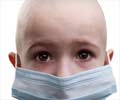Pediatric neuroblastoma patients are at elevated risk for long-term psychological impairment, revealed research.

In the United States, neuroblastoma--a childhood cancer of nerve cells--is diagnosed at a median age of 17.3 months. Treatment advances in recent years have prolonged survival for many affected children, but their young age at diagnosis and the specific therapies they receive can make them vulnerable to health problems as their central nervous system develops.
To assess the long-term psychological effects of neuroblastoma and its treatment, Nina Kadan-Lottick, MD, MSPH, of Yale University School of Medicine and her colleagues studied 859 children who had been diagnosed with neuroblastoma at least five years earlier and were under 18 years old. Their median age at diagnosis was 0.8 years, and they were followed for a median of 13.3 years. These 859 neuroblastoma survivors were compared with 872 siblings of childhood cancer survivors.
Compared with siblings, neuroblastoma survivors had an increased prevalence of impairment in the domains of anxiety/depression (19 percent versus 14 percent), headstrong behavior (19 percent versus 13 percent), attention deficits (21 percent versus 13 percent), peer conflict/social withdrawal (26 percent versus 17 percent), and antisocial behavior (16 percent versus 12 percent).
Common treatments--vincristine, cisplatin, and retinoic acid--were not associated with impairment, but survivors who developed chronic health conditions as a result of their cancer treatment were at higher risk for developing worse outcomes. Specifically, developing pulmonary disease was linked with an increased risk of impairment in all five domains, and developing endocrine disease and peripheral neuropathy were each linked with impairment in three domains. In addition, survivors who experienced psychological impairment tended to require special education services and to not go on to college.
“Before recent advances in treatment, this survivor population was much smaller and we were not able to analyze these sorts of long-term outcomes," said Dr. Kadan-Lottick. "The goal is not simply to get our patients to be cancer-free but also to optimize their mental, emotional, and social functioning as they move into adolescence and adulthood. Our hope is that these findings will help inform strategies for early screening and intervention to identify those survivors at highest risk for developing psychological and educational impairment later on in life."
Advertisement
Source-Eurekalert











